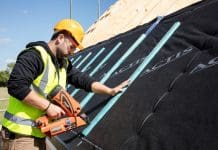The installation of Spacetherm WL insulation is set to improve the heating efficiency of a Victorian, three floor, semi-detached house in south-east London
Major heat loss and high heating costs are a common problem with many Victorian houses and solid wall dwellings.
Property owner Sean Crawford has lived in the property on Kelmore Grove for 15 years and has already made significant investments to improve the energy and heating efficiency of his Victorian house.
Improvements include a new condensing boiler, draught-proofing, solar PV panels, double glazing and many more. However, when the heating is not on, the living room is still cold, with much of the heat loss down to the solid wall construction.
Crawford explains: “Living in a Victorian house we have a lot of original cornicing in the living room that with standard internal insulation would be ruined. Also, most insulation types would lead to a significant loss of internal space.
“Over the years I’ve reviewed what is available and disregarded it as a possible solution/ improvement. I’ve even tried other thermal wall lining products, but unfortunately, I have to say they don’t work very well. It was only recently that I came across Spacetherm WL from the A. Proctor Group.
“The reasons that I chose to use Spacetherm WL are, that it is super thin and highly insulating. The product is very easy to install, which means I can fit it myself as a DIY project, unlike external wall insulation, and importantly I can fit one room at a time, which works well as I have four other rooms to insulate which all have external solid walls.”
How Spacetherm WL works
Spacetherm WL is specifically designed to be fixed to the internal surfaces of existing solid walls without the need for mechanical fixings. It also consists of Spacetherm aerogel insulation blanket bonded to 3mm Magnesium Board (MgO), for use in applications where improved heating efficiency is required with limited space.
At 13mm thick, the use of Spacetherm WL is beneficial for refurbishment projects where space is at a premium.
Typically, a solid wall will have a U value of around 2.1 W/m2 K. Following the application of Spacetherm WL, this can be reduced to around 0.8 W/m2 K, dependent on the wall structure.















We’re told that solid walls of older buildings need to ‘breathe’
Does Spacetherm WL prevent this?